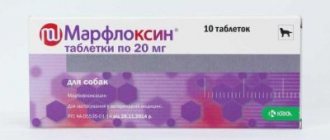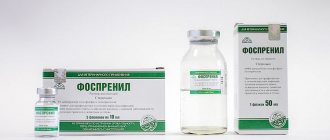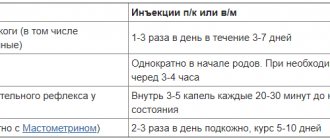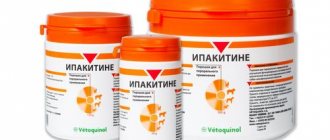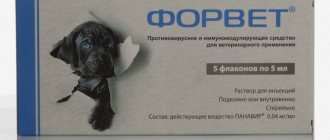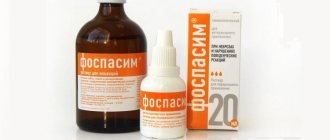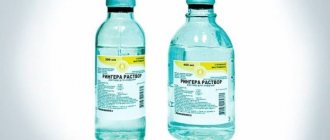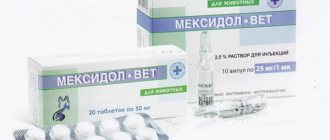What it is
Homeopathy is an alternative medicine and is considered a pseudoscience by many scientific communities. Veterinarians usually prescribe drugs from this group to reassure the dog's owner, rather than to help the dog itself. After some time, the pet really feels better, but this is the merit of his own body, which was able to overcome the disease.
Verakol is produced by the Russian (Helvet group). Since the end of the last century, the organization has been producing homeopathic remedies for veterinary medicine. The manufacturer indicates the following active ingredients in the drug:
- Arsenicum album D10 (white arsenic). As part of Veracol, it is not a poison, but a medicine. In homeopathic doses, white arsenic relieves muscle spasms, eliminates bloating, relieves inflammation, and has an indirect antibacterial effect in the gastrointestinal tract.
- Podophyllum D8 (thyroid nogo). This poisonous plant is otherwise called podophyllum. It acts primarily on the intestines and liver, relieving spasms, eliminating inflammation and healing ulcers. Nogolistik has a laxative and choleretic effect.
- Veratrum album D8 (white hellebore). Another poisonous plant that is safe in homeopathic doses. It is used to relieve spasms, improve intestinal motility, and reduce the amount of fluid excreted from the body (diarrhea, vomiting).
- Colocynthis D8 (bitter gourd). The component relieves spasms, reduces pain, and has antidiarrheal properties. Bitter gourd creates a film on the intestinal walls that protects the organ from toxic substances and accelerates the healing process.
The numbers next to each component are the degree of dilution or, as homeopaths say, potency. To prevent the toxic substance from harming the dog, it is diluted tens, hundreds and thousands of times.
All components of Veracol are presented in decimal potency - this is indicated by the letter D. For example, white arsenic is diluted in a ratio of 1 to 10 to the 10th power, and the remaining active ingredients are 1 to 10 to the 8th power.
Whether or not to give your dog homeopathic remedies is a personal matter for each owner. The benefit of such medications is that they are harmless - there is no negative effect on the liver and kidneys, and you cannot overdo it with the dosage.
However, if your pet is seriously ill, using homeopathy instead of traditional medicine can cost your pet his life because you will waste time on the wrong treatment.
Description of the drug
Indications for the use of Veracol are digestive disorders and concomitant diseases. The drug is also effective for inflammatory processes in the gastrointestinal tract in your pet’s body.
The drug is prescribed for therapeutic purposes to animals of all age groups. You can buy Veracol for cats at a veterinary pharmacy. This drug is produced in the form of solutions with the same effect:
- For injection. Available in volumes of 10 and 100 ml.
- Drops for oral use. Sold in 20 ml plastic bottles with a dropper.
- In tablet form. Sold 30 pieces per package.
It is important to note that if the dosage is observed, Veracol is completely harmless to your pet. The secret of the medicine is that it contains components that have been used in homeopathy for two centuries.
Also read: Milbemax for cats: instructions for use
During this time, the composition of the drug has managed to prove itself as an effective remedy for the treatment of diseases of the digestive system. It contains the following active substances:
- Podophyllum. The roots of this plant are used to create tinctures and medicines. With the help of podophyllum, homeopaths heal the small intestine, rectum and liver. However, in large doses, the medicinal plant can lead to vomiting and diarrhea.
- Arsenicum album. Translated into Russian, the name of this component sounds somewhat scary - white arsenic. The same arsenic that has poisoned countless people and animals. But don’t panic, in addition to its destructive effects, white arsenic does an excellent job of intoxicating and removing dangerous poisons from the body. This plant also has analgesic, antiseptic and antibacterial effects.
- Veratrum album. This plant is also considered poisonous. Despite this, Veratum album was one of the first to be used in homeopathy. In the right doses, this plant can relieve pain and relieve spasms.
- Colocynthus. The main pain reliever in the world of homeopathy. This plant copes well with various types of pain and is actively used in the pharmaceutical industry.
Release forms
The standard type of Veracol is 2 or 5 ml ampoules. They are packed in plastic packages of 5 pieces each, and then placed in cardboard boxes. The name and quantity of the drug is written on each ampoule.
There are other forms of release of the product:
- Bottles with a volume of 10 to 500 ml with solution for injection. The drug is the same as in small ampoules, only there is more of it.
- Drops for oral use. Supplied in 20 ml polymer bottles with a dispensing nozzle at the end.
- Pills. Packed in 50 pieces in polymer containers with a screw cap.
Veracol is not available in other forms. Some people confuse tablets with capsules or drops with syrup, but there are no such products.
Which form of the drug to choose
Cantaren for cats: instructions for use
When prescribing Verapol, the veterinarian is guided by the general condition of the animal, ease of administration and cost. The specialist relies on the diagnostic examination data. In case of serious disorders of the digestive tract, the pills do not dissolve in the gastrointestinal tract; cats are prescribed injections or oral drops.
If the cat refuses the pill, choose another form of medication
Pharmacological properties
Veracol in any form of release has the same effect on the dog’s body:
- relieves inflammation in the gastrointestinal tract, normalizes intestinal peristalsis (contraction), disturbed by infection or parasites;
- relieves muscle spasms accompanied by aching pain;
- restores the condition of the intestinal mucosa after prolonged diarrhea;
- promotes the healing of wounds and ulcers on the walls of the stomach and intestines;
- restores the tissue barrier of the digestive system organs, damaged due to bacterial infections;
- normalizes the secretion of intestinal glands;
- stops the growth and development of staphylococci and streptococci, which is especially important when treating puppies, for whom not every antibiotic is suitable;
- helps restore impaired liver function.
Compound
The homeopathic drug Veracol combines the action of several ingredients:
- white arsenic. The substance is poisonous, however, the minimum dosage explains the lack of toxic effects on the body and, at the same time, the therapeutic effect. White arsenic kills dangerous bacteria that cause disruption of the functioning of the gastrointestinal tract;
- white hellebore. An effective herbal component to eliminate pain, colic, and spasms. Stimulates intestinal motility, reduces nausea, helps with vomiting in dogs;
- bitter gourd. A useful ingredient in the treatment of digestive disorders, to combat diarrhea. Bitter pumpkin has a positive effect not only on the digestive system, but also on the genitourinary system. Plant extract normalizes liver function;
- Thyroid nofoil. Natural component with choleretic effect. Eliminates the symptoms of diarrhea, activates the regeneration of the intestinal and stomach mucous membranes.
Does toxicosis occur in dogs, how does the pathological condition manifest itself and how to help the animal? Read useful information.
Consumer opinions and veterinarian reviews about Chappie food for small breed dogs can be seen in this article.
When to use
Based on the description of the active substances and pharmacological properties, it is clear that Veracol is effective in combating diseases of the digestive system. It is prescribed in the following cases:
- gastritis (inflammation and irritation of the gastric mucosa);
- gastroenteritis (inflammation of the mucous membrane of the stomach and small intestine);
- acute and chronic dysbacteriosis (violation of the composition of the microflora of the gastrointestinal tract);
- enteritis (inflammation in the intestines);
- enterocolitis (inflammation in the intestines, leading to allergies, organ irritation, necrosis of the mucous membrane);
- flatulence (increased gas formation);
- intestinal colic;
- diarrhea;
- pancreatitis (inflammation of the pancreas);
- dyspepsia (indigestion);
- poisoning;
- indigestion.
Veracol helps restore the functioning of the digestive system after poor nutrition and other factors that inhibit the activity of the gastrointestinal tract.
Veracol for cats instructions for use
It is recommended that you consult your veterinarian before using a veterinary product . The doctor must make a diagnosis and prescribe appropriate treatment.
Also study information about the drug: Azinox for cats
According to experts, the most effective is the injection form of the drug. Because it guarantees that a sufficient amount of medicine enters the body of a sick animal. The medicine is administered subcutaneously and intramuscularly.
If the pet owner prefers the capsule form of the drug, then the most convenient way to feed it to the cat is to grind the tablet and mix it with his favorite food. One of the advantages of the tablets is that they have absolutely no taste. The cat will not feel “foreign” smells or unusual tastes when eating its favorite treat.
Medicine drops are instilled directly onto the cat's tongue.
They also have no taste. It is important to remember that after handling the drug you must wash your hands thoroughly with soap. The injection conditions must be sterile to prevent infection.
For what diseases is Veracol used?
This drug has a fairly wide range of uses. Veterinarians usually prescribe Veracol to cats suffering from the following ailments:
- acute and chronic diarrhea;
- gastritis;
- constipation;
- flatulence;
- intestinal dysbiosis;
- painful digestion;
- worms;
- inflammatory processes of the gastrointestinal tract.
Contraindications
If the correct dosage is observed, Veracol has no contraindications or side effects. After consultation with a veterinarian, the medicine should be used according to clear instructions to avoid overdose.
Contraindications include acute infectious diseases and obstruction of urolithiasis. It is recommended to carry out therapy in the absence of signs of intoxication.
Mode of application
Instructions for use of the drug Veracol depend on the form of release. It is better to entrust the selection of dosage to a doctor who will take into account the specifics of the disease, the age and weight of the dog.
Injection
According to the instructions, injections are given intramuscularly (in the thigh) or subcutaneously (in the withers). You can carry out the procedure yourself, without going to the veterinarian every time, if you are not afraid of harming the dog.
Injection Veracol is already ready for use; it does not need to be diluted with anything. The dosage is determined at the rate of 1 ml of product per 1 kg of animal weight. The medicine must be injected 2-3 times a day, the course of treatment lasts 5-10 days.
Pills
The dosage of Veracol in this release form depends on the disease. For mild to moderate inflammation, the dog is given 1 tablet twice a day. If the disease is serious, then the dosage is increased to 3 pieces per day.
If the dog does not have an inflammatory disease, then how many tablets he will need depends on the size of the pet:
- large – 3 tablets per day;
- medium – 2 tablets per day;
- small – 1 tablet per day.
It is necessary to give the dog Veracol for 5-10 days, or until the symptoms of the disease completely disappear. The course can be repeated without interruption, after consulting with a veterinarian.
The drug must be taken orally, which means you will have to put the tablet in your pet's mouth and have him swallow it. If this is difficult, then the product should be crushed and diluted in water or mixed with food.
How much does it cost and where to buy
The price of Veracol is quite acceptable for most cat owners. It depends on the form of release:
- solution for injections 10 ml – 280-300 rubles;
- tablets 50 pcs. – 140-170 rubles;
- drops for oral administration – 245-270 rubles.
The injection solution is sold in almost all veterinary pharmacies, but drops or tablets can be more difficult to find, especially in small provincial towns. An alternative may be to purchase the drug in an online store.
You can now view the current price of the drug and buy it right here:
Storage conditions
The injection solution and drops are stored in a place protected from sunlight. There is no need to put the drug in the refrigerator - Veracol feels great at temperatures from 0 to 25 degrees. It can be stored for 3 years from the date of manufacture.
The tablets can be kept in the veterinary medicine cabinet along with other medications. The main thing is that sunlight does not fall on the drug. The tablets retain their properties at temperatures from -3 to +25 degrees. The shelf life is 5 years from the date of manufacture.
Contraindications and side effects
Veracol is a safe drug, as are its homeopathic substitutes. It has no contraindications. The only limitation is individual intolerance to the components of the product, but this is rare. The active ingredients in the medicine are present in minimal concentrations, so they usually do not cause allergies.
The product also has no side effects. According to reviews from dog owners and veterinarians, after taking Veracol, the animals did not change their behavior, they did not lose their appetite. There were no changes in the analyzes either. The components of the drug do not accumulate in the body, but are eliminated naturally, and therefore do not cause harm.
Reviews
Tatyana, 38 years old, Chelyabinsk
“They found pancreatitis in my Toffee, they said it was due to cheap food (they fed Pedigree). The veterinarian prescribed several medications, including Veracol. I injected myself twice a day under the withers. After 5 days, Toffee began to show interest in food again. I don’t know exactly what medicine helped, but now I always keep Veracol at home just in case.”
Oleg, 31 years old, Novokuznetsk
“Never give your dog any medication without consulting your veterinarian! I have a mongrel dog, picked up on the street. A couple of months ago I noticed that he was not eating well, and after a while diarrhea appeared. I read about Verakol, took it for a week, and the dog’s condition returned to normal. A month later everything happened again, we went to the vet, it turned out to be helminths. The doctor said that Verakol simply muffled the symptoms, and the poor animal suffered all this time.”

